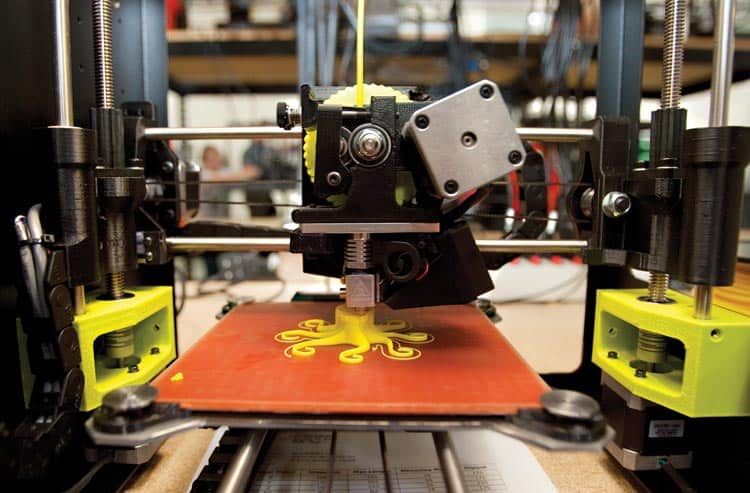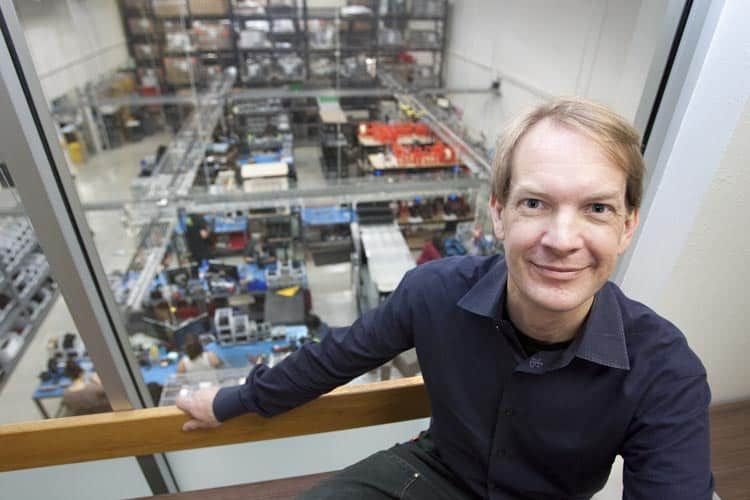Desktop 3-D printers hit big time with little things
Aleph Objects printing its own replacement parts

LOVELAND — With the evolution of 3-D printing accelerating in exponential fashion, how could a small Loveland company distinguish itself in a world in which the industry is launching into prosthetics, edibles and perhaps even custom pharmaceuticals?
The apparent answer in the mind of the founder, chief executive and president of Aleph Objects, Inc. was to go as open as possible – open hardware specifications and open software code.
“Our president, Jeff Moe, he was a successful entrepreneur in various free software and open-source hardware over the years,” said Harris Kenny, communications manager for the firm. “When there was a lot of experimentation happening as it related to 3-D printing, his idea was basically to build a company that has shared build files and source code for the hardware – anything you need to make the printers work.”
SPONSORED CONTENT
The proof of that concept is probably well expressed in the pudding. Sales of the LulzBot TAZ 5 3-D and the LuzBot Mini 3-D desktop printers and their parts have been building at an incredible rate. Kenny said sales in 2011 were at $71,940, before jumping to $523,659 the next year, $1,656,501 in 2013 and $4,762,314 in 2014.
Estimated sales by Aleph this year are expected to reach $10 million, Kenny said. Currently the company has 89 employees, and is expected to rapidly expand both its workforce and network of resellers.
“It’s really been an exciting time for the company,” said Kenny.

That’s pretty heady stuff, even though Moe has a fairly extensive entrepreneurial background. He founded Verinet Communications, an Internet service provider acquired by Front Range Internet Inc. in 2002, and also co-founded Andenken Gallery, now known as the Andenken/Battalion gallery. Kenny said his president has extensive experience in numerous free software and open-source hardware projects.
Aleph’s open-source software, Cura LulzBot, has been recognized by the Free Software Foundation, and is supported by the Debian, Ubuntu and Fedora Linux distros, as well as Windows and Mac platforms. Aleph supports both software and hardware open-source communities, but it is in the latter that outside innovation is most easily demarcated.
“The folks over at NASA really like (the LulzBot printers) because it’s a platform design,” said sales manager Josh Bryant. “But the trouble was they were printing so hot they kept melting the platform. So they just took the build specifications and built another platform that wouldn’t melt.
“We make all those files available to you when you buy the machine,” he said.
People often ask about the reliability of the printers and their ability to master complex and exacting specifications, Bryant said. The easiest explanation on hand, he said, is to show them a clustered network of 145 Lulzbot printers making parts for new printers and replacement.
“It’s absolutely fascinating,’ said Bryant about the self-replicating bots. About 43 of the parts used by the larger desktop printer can be replicated by itself, as well as about 30 of the parts for the smaller printers. Interested locals can drop by the company, at 626 W 66th St. in Loveland, at 2 p.m. every Friday for a tour.
The printers themselves are open to the very core. Both the Lulz Mini, which retails at $1,350, and the Lulz Taz ($2,200) are accessible right down to the silicon microcontrollers.
Both printers are powered by Arduino-compatible RAMBo boards — all-in-one 3-D printer motherboard, featuring 8-bit microcontrollers (or processors). RAMbo stands for (R)epRap (A)rduino-(M)ega-compatible (M)other(Bo)ard.
Bryant said that both the software and hardware communities have contributed a great deal to the firm’s success, by suggesting or implementing improvements to the system. While that’s also an open invitation for a company to come in and copy everything from ground zero, he said that has not been a concern at Aleph Objects.
“We have contributors who have made a lot of modifications that we have adopted,” he said. “We really do have a hugely devoted fan base, because our printers are so usable and everything down to the motherboards can be modified.”
“It is theoretically possible for someone to come and copy everything,” Bryant said, but they wouldn’t have the open-source community to help them chart new developments.
Bryant said his own background is in sales and corporate leadership, but he’s impressed by how little it takes to motivate the technological experts working at Aleph.
“It’s been a super happy experience for me,” Bryant said, noting that while not a technologist, he has long been interested in 3-D printing.
“When you walk around here, everyone has a smile on their face,” he said. “We’re very proud to make the best 3-D printer out there.”
LOVELAND — With the evolution of 3-D printing accelerating in exponential fashion, how could a small Loveland company distinguish itself in a world in which the industry is launching into prosthetics, edibles and perhaps even custom pharmaceuticals?
The apparent answer in the mind of the founder, chief executive and president of Aleph Objects, Inc. was to go as open as possible – open hardware specifications and open software code.
“Our president, Jeff Moe, he was a successful entrepreneur in various free software and open-source hardware over the years,” said Harris Kenny, communications manager for the firm.…
THIS ARTICLE IS FOR SUBSCRIBERS ONLY
Continue reading for less than $3 per week!
Get a month of award-winning local business news, trends and insights
Access award-winning content today!
